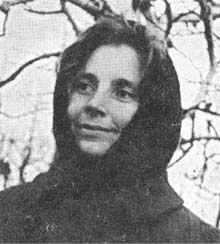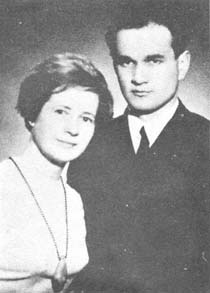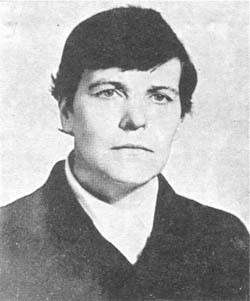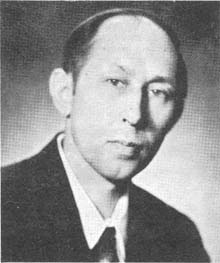Editor of this issue: V. Stanley Vardys
Copyright © 1979 LITUANUS Foundation, Inc.

|
LITUANUS
LITHUANIAN QUARTERLY JOURNAL OF ARTS AND SCIENCES
Volume 25, No.2 - Summer 1979
Editor of this issue: V. Stanley Vardys ISSN 0024-5089
Copyright © 1979 LITUANUS Foundation, Inc. |

|
PORTRAITS OF FOUR LITHUANIAN DISSIDENTS:
Gajauskas, Plumpa-Pluira, Pranskūnaitė, Sadūnaitė
 |
NIJOLĖ SADŪNAITĖ, a professor's daughter, at the time of her trial on June 16-17, 1975, was 37 years old. She was arrested on August 27, 1974, charged under Art. 68 of the Criminal Code, and received a three year sentence in a strict regime camp to be followed by a three year exile from Lithuania. She was confined to a Mordovian camp and after serving her sentence was sent into exile to Boguchany, Krasnoiarsk territory. The "crime" of Sadūnaitė was the typing of some issues of The Chronicle of the Catholic Church of Lithuania. At her trial she said she was happy to suffer for helping a publication that fought the imposition of tyranny over the mind of man. Declared prisoner of conscience by Amnesty International, she has received international attention, though not all letters or packages mailed to her. In very poor health she now is serving her term in exile. |
 |
PETRAS PLUMPA-PLIUIRA, a 39 year old worker, since 1974 is serving a seven-year sentence for the duplication of four issues of The Chronicle of the Catholic Church of Lithuania and of other samizdat literature (illegal violations of Criminal Code Art. 68 and 70). He is kept in a strict regime camp of Perm. Plumpa has to serve an additional three years for the alleged falsification of personal identity papers. Plumpa was only 18 when in 1958 he was the first time sentenced to serve seven years for the possession of a "weapon" (relic of World War II), actually, for participating in the All-Souls evening demonstration during which the demonstrators raised the Lithuanian tricolor. Not allowed to hold a job in Lithuania after his release from a Mordovian camp, he had doctored his personal documents so he could work to support his family. The court disregarded the fact that Plumpa informed authorities and the authorities, in turn, had agreed to straighten out the question of his identity papers. (On Soviet treatment of returning prisoners see Helsinki group document No. 9, pp. 72-75). A deeply religious and patriotic Lithuanian of already ruined health, he is an internationalist in his personal associations and political persuasion. |
 |
ONA PRANCKŪNAITĖ, a factory worker in Panevėžys, was arrested in January of 1977 and on July 20-25, 1978, tried for the violation of Art. 199 of the Criminal Code. Her codefendents were Vladas Lapienis and Jonas K. Matulionis. Ona Pranckūnaitė was sentenced to two years of labor camp which she served in Mordavia (Barashevo), in the Chuvash Aut. SSR (Kozovka), and in the city of Ul'ianovsk. She was sentenced for aiding in the duplication of The Chronicle of the Catholic Church of Lithuania. Pranckūnaitė was 42 when sentenced. She was first sentenced to a Stalinist concentration camp in 1951, at the age of 15, for composing a humorous ditty about collective farms. At that time she served six years of her sentence. |
 |
BALYS GAJAUSKAS, a fifty-two-year-old Lithuanian, was arrested in April, 1977, in Vilnius for collecting materials on the postwar nationalist movement in Lithuania and helping present and former political prisoners and their families. On April 14 he was convicted in Vilnius of "anti-Soviet agitation and propaganda" and sentenced to ten years in a corrective labor colony and five years' internal exile. In 1973 Balys Gajauskas completed a twenty-five-year term of imprisonment for participating in post-war Lithuanian nationalist activities aimed at independence from the Soviet Union. In the corrective labor colonies Gajauskas is reported to have been highly respected by his fellow political prisoners for his conviction that the struggle for human rights is everyone's concern, regardless of nationality. Upon his release in 1973 Balys Gajauskas became active in helping political prisoners and their families. Before his arrest last year Gajauskas was searched and interrogated several times, during which the authorites confiscated lists of Lithuanian political prisoners and addresses of their families. Gajauskas received the maximum sentence and, as a "recidivist," must serve his ten-year sentence in a "special regime" corrective labor colony, the most rigorous category of labor camp in the USSR. |
___________________________________________________________________________________________________________
For further information on what can be done to help this and other prisoners contact
Amnesty International, 2112 Broadway, New York, N.Y. 10023.